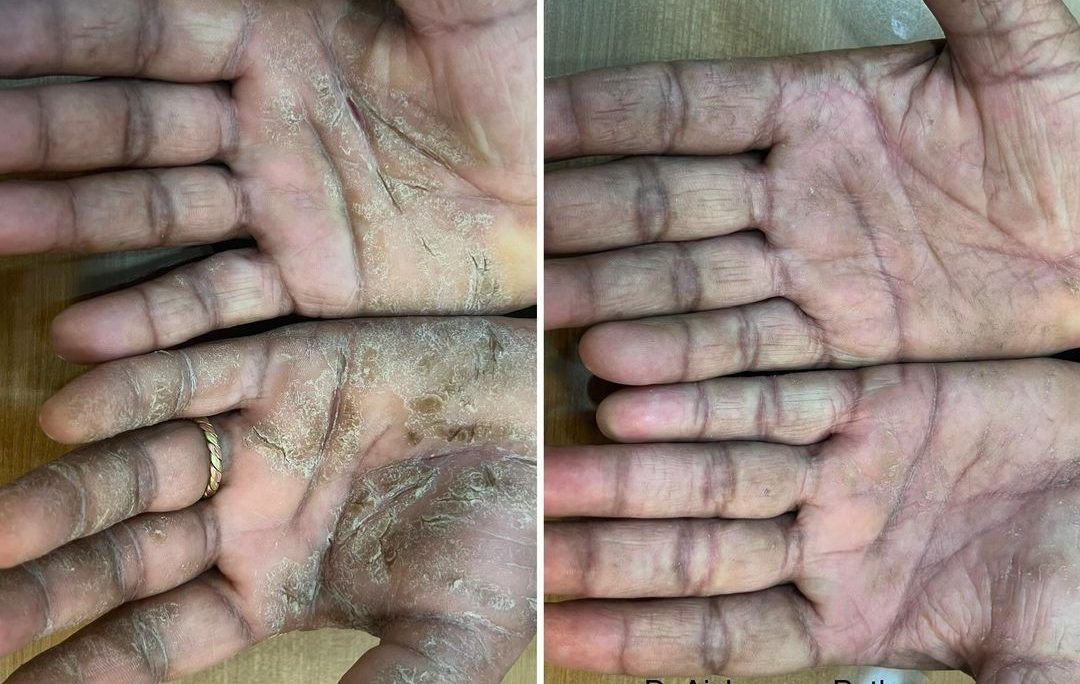Psoriasis is a chronic (long-lasting) disease in which the immune system becomes overactive, causing skin cells to multiply too quickly. Patches of skin become scaly and inflamed, most often on the scalp, elbows, or knees, but other parts of the body can be affected as well. Scientists do not fully understand what causes psoriasis, but they know that it involves a mix of genetics and environmental factors.
The symptoms of psoriasis can sometimes go through cycles, flaring for a few weeks or months followed by periods when they subside or go into remission. There are many ways to treat psoriasis, and your treatment plan will depend on the type and severity of disease. Mild psoriasis can often be successfully treated with creams or ointments, while moderate and severe psoriasis may require pills, injections, or light treatments. Managing common triggers, such as stress and skin injuries, can also help keep the symptoms under control.
Having psoriasis carries the risk of getting other serious conditions, including:
- Psoriatic arthritis, a chronic form of arthritis that causes pain, swelling, and stiffness of the joints and places where tendons and ligaments attach to bones (entheses).
- Cardiovascular events, such heart attacks and strokes.
- Mental health problems, such as low self-esteem, anxiety, and depression.
- People with psoriasis may also be more likely to get certain cancers, Crohn’s disease, diabetes, metabolic syndrome, obesity, osteoporosis, uveitis (inflammation of the middle of the eye), liver disease, and kidney disease.
Who Gets Psoriasis?
Anyone can get psoriasis, but it is more common in adults than in children. It affects men and women equally.
Types of Psoriasis
There are different types of psoriasis, including:
- Plaque psoriasis. This is the most common kind, and it appears as raised, red patches of skin that are covered by silvery-white scales. The patches usually develop in a symmetrical pattern on the body and tend to appear on the scalp, trunk, and limbs, especially the elbows and knees.
- Guttate psoriasis. This type usually appears in children or young adults, and looks like small, red dots, typically on the torso or limbs. Outbreaks are often triggered by an upper respiratory tract infection, such as strep throat.
- Pustular psoriasis. In this type, pus-filled bumps called pustules surrounded by red skin appear. It usually affects the hands and feet, but there is a form that covers most of the body. Symptoms can be triggered by medications, infections, stress, or certain chemicals.
- Inverse psoriasis. This form appears as smooth, red patches in folds of skin, such as beneath the breasts or in the groin or armpits. Rubbing and sweating can make it worse.
- Erythrodermic psoriasis. This is a rare but severe form of psoriasis characterized by red, scaly skin over most of the body. It can be triggered by a bad sunburn or taking certain medications, such as corticosteroids. Erythrodermic psoriasis often develops in people who have a different type of psoriasis that is not well controlled, and it can be very serious.
Symptoms of Psoriasis
Symptoms of psoriasis vary from person to person, but some common ones are:
- Patches of thick, red skin with silvery-white scales that itch or burn, typically on the elbows, knees, scalp, trunk, palms, and soles of the feet.
- Dry, cracked skin that itches or bleeds.
- Thick, ridged, pitted nails.
- Poor sleep quality.
Some patients have a related condition called Psoriatic arthritis, which can be characterized by stiff, swollen, or painful joints; neck or back pain; or Achilles heel pain. If you have symptoms of psoriatic arthritis, it is important to see your doctor soon because untreated psoriatic arthritis can lead to irreversible damage.
The symptoms of psoriasis can come and go. You may find that there are times when your symptoms get worse, called flares, followed by times when you feel better.
Causes of Psoriasis
Psoriasis is an immune-mediated disease, which means that your body’s immune system starts overacting and causing problems. If you have psoriasis, immune cells become active and produce molecules that set off the rapid production of skin cells. This is why skin in people with the disease is inflamed and scaly. Scientists do not fully understand what triggers the faulty immune cell activation, but they know that it involves a combination of genetics and environmental factors. Many people with psoriasis have a family history of the disease, and researchers have pinpointed some of the genes that may contribute to its development. Many of them play a role in the function of the immune system.
Some external factors that may increase the chances of developing psoriasis include:
- Infections, especially streptococcal and HIV infections.
- Certain medicines, such as drugs for treating heart disease, malaria, or mental health problems.
- Smoking.
- Obesity.
#hospital #pune #pcmc #chinchwad #health #healthcare #skin #dermatologist #skinspecialist #skinclinic #hairdermatologist #skindoctor #dermatologistappointment #skincareprofessional #derma #skindr #pimples #acne #psorasis #psorasistreatment













